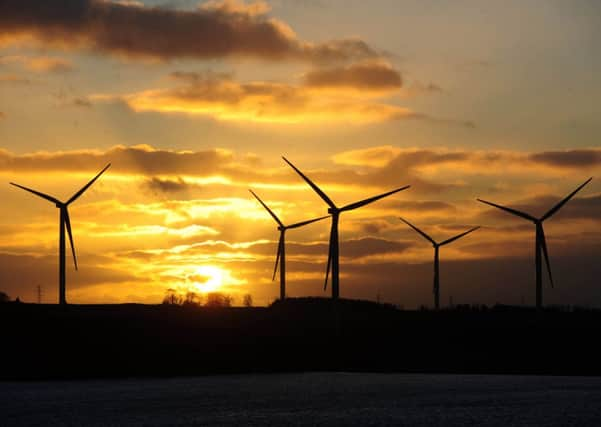2015 will definitely be a big carbon date


The year 2015 is going to be a momentous year. It is the culmination of a quarter of a century of tortuous twists and turns in global debates about what, if anything, should be done about society’s unintentioned emissions of greenhouse gases. The outcome of intergovernmental negotiations in Paris at the end of this year will determine the political will to deliver change (or not) at a global level for a generation.
I think we would all wish them wisdom in their deliberations. But for those of us who are sceptical of the ability of intergovernmental negotiations to lay out a clear and meaningful path to a resilient, low carbon and prosperous future, the words and wisdom of Niccolo Machiavelli seem apposite:
Advertisement
Hide AdAdvertisement
Hide Ad“There is nothing more difficult to take in hand, more perilous to conduct, or more uncertain in its success, than to take the lead in the introduction of a new order of things. For the reformer has enemies in all those who profit by the old order, and only lukewarm defenders in all those who would profit by the new order, this lukewarmness arising partly from fear of their adversaries … and partly from the incredulity of mankind, who do not truly believe in anything new until they have had actual experience of it.”
Machiavelli’s words are a powerful reminder that it is one thing to have a vision for a better future (as the Paris negotiators clearly do), it is quite another to be able to demonstrate that the vision works. In other words, if we really want people to believe in the benefits of a “resilient, low carbon society”, we need to give people actual experience of it.
And that is where we – collectively in Scotland – can help. We are beginning to demonstrate that you can make the transition to low carbon forms of energy, without excessive cost; and have thriving communities and a robust economy routed in resource efficiency. While there is natural reticence in Scotland to shout about our achievements, other countries are beginning to notice.
This week, the Edinburgh Centre for Carbon Innovation will lead a group of businesses and academics from Scotland – together with a group from London – to share our low carbon experiences with Shanghai city authorities at a summit in China.
It follows from the adoption by the Chinese National Government of a set of policies that aims to reduce the environmental impact of their economic growth. As part of this, Shanghai – which itself has a GDP of £250 billion – is setting up eight Low Carbon Demonstration free trade zones, to showcase global best practice, business opportunities and education in low carbon techniques.
The Low Carbon Summit will showcase practical experiences of what works, and what does not, in the process of redeveloping a low carbon city, drawing on London and Scottish experiences. It will explore Government policy, action, and strategy options by combining design guidelines, investment support, technology innovation and community initiatives to drive low carbon development in all its forms.
Scotland should celebrate the participation of its businesses and academics in such summits, and the business and economic opportunities that arise from building partnerships with global cities such as Shanghai.
The Shanghai visit kicks off an ambitious year of international development for the Edinburgh Centre for Carbon Innovation (ECCI), with the opening of ECCI’s first satellite centre in Hong Kong planned for later in the year, a base in the University of Edinburgh’s New York office already established and ties developing across the Asia Pacific and Latin American regions.
Advertisement
Hide AdAdvertisement
Hide AdThese opportunities arise because of the high esteem in which Scotland is held by countries that wish to deliver a robust low carbon economy, but are still struggling with its practical delivery.
The Edinburgh Centre for Carbon Innovation will return to the Asia Pacific in March with a delegation of low carbon project partners from its pioneering Smart Accelerator programme. The Smart Accelerator programme supports eight city, three island and five mobility projects across Scotland, which receive direct support to create fully packaged partnerships ready for financial investment. Individual projects receive advice and practical support ranging from pilot funding, project management, marketing and communications, to industry, academic and international expertise that helps to shape and deliver the projects. The delegation will also visit the Chinese province of Shenzhen, the focus of a commitment to closer cultural and creative collaboration with the City of Edinburgh.
These initiatives aim to demonstrate the viability and practicalities of large-scale low carbon projects around the world. As they are implemented over the next year or two, we might move closer to meeting Machiavelli’s challenge to reformers, that humans do not truly believe in anything new until they have experienced it for themselves.
But in seeking to showcase Scottish experiences around the world, from Government policies to business acumen, let us also remind ourselves of another thought from Machiavelli:
“All courses of action are risky, so prudence is not in avoiding danger (which is impossible), but calculating risk and acting decisively. Make mistakes of ambition and not mistakes of sloth. Develop the strength to do bold things, not the strength to suffer.”
• Andy Kerr is Executive Director of Edinburgh Centre for Carbon Innovation